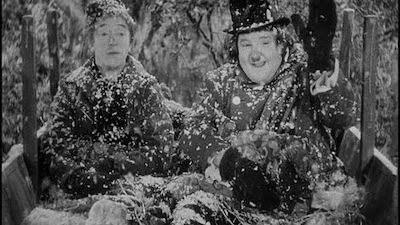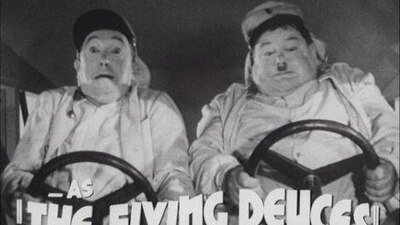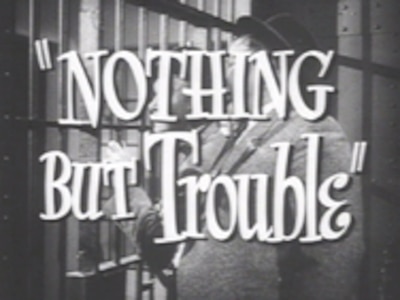Oliver Hardy

About
Biography
Filmography
Family & Companions
Bibliography
Notes
"As a child I got into a habit that I still have. Lobby watching. I sit in the lobby and I watch people. I like to watch people. Once in a while someone will ask me where Stan and I dreamed up the characters we play in the movies. They seem to think that those two fellows aren't like anybody else, but there are plenty of Laurels and Hardys in the world. Whenever I travel, I am still in the habit of sitting in the lobby and watching the people walk by--and I tell you, I see many Laurels and Hardys. I used to see them in my mother's hotel when I was a kid: the dumb, dumb guy who never has anything bad happen to him--and the smart, smart guy who's dumber than the dumb guy only he doesn't know it." --Oliver Hardy to John McCabe in 1954
"[Hardy] was playing the part of a maitre d' who was coming in with a cake to be served. As he steps through a doorway, he falls and finds himself on the floor, his head buried in the cake. I shouted to him, 'Don't move! Above all, don't move! Stay like that, the cake should burn your face!' And for a minute and a half, the public couldn't stop laughing. Hardy remained immobile, his head in the cake!" --Leo McCarey, quoted in "A Biographical Dictionary of Film" by David Thompson (New York: Alfred A Knopf, 1994)
Biography
Portly, pompous, and in a nearly constant state of exasperation due to the childlike shenanigans of his reed-thin companion, Oliver Hardy was one-half of possibly the greatest comedy duo of all time. Raised in a small town in Georgia, Hardy fell madly in love with the new medium of film while working at a local movie theater. After launching a successful career in silent films on the East Coast with production outfits like the Lubin Manufacturing Company, he made the move to Hollywood in 1917. Working as a solo freelancer in dozens of pictures, Hardy ultimately crossed paths with fellow comedic actor Stan Laurel at Hal Roach Studios. When an astute director at the studio recognized their onscreen chemistry, they were paired in such early short films as "Duck Soup" (1927) and "Putting Pants on Philip" (1927). So strong were their comedic abilities that even the addition of sound to film - the death knell to the careers of so many of their contemporaries - did nothing to diminish their appeal. At the height of their popularity, films like "The Music Box" (1932), "Sons of the Desert" (1933), and "Babes in Toyland" (1934) were all considered instant classics. Although their output diminished greatly in the years following their departure from Roach Studios in 1940, the high esteem in which they were held by adoring fans the world over never did. Frequently and unjustly underappreciated in his day, it can be said that if Stan Laurel were the brains behind the team of Laurel and Hardy, then Oliver 'Babe' Hardy was most certainly its heart and soul.
Born Norvell Hardy on Jan. 18, 1892 in Harlem, GA, he was the son of Emily Norvell and Oliver Hardy, a Confederate Civil War veteran and Columbia County tax collector. Sadly, his father passed away before his first birthday, and in later years, the young Hardy would adopt the first name 'Oliver' in his father's memory. A precocious child, Oliver gained a unique education in humanity by observing guests in the lobby of the hotel his mother managed in the years after his father's death. Traditional learning, however, was never a priority for Hardy, who chafed under the structure of the various military and boarding schools he attended - and ran away from - in his youth. Exhibiting an early aptitude for music, Mrs. Hardy sent her son to study with famed vocal teacher Adolf Dahm-Petersen in Atlanta. Not surprisingly, the formality of the training did not sit particularly well with Hardy, who preferred to make money on the side by singing with a vaudeville act in the evenings. Before long he had returned to his hometown of Milledgeville. Fortuitously, a movie theater had just opened there, so in 1910 he took a job as the projectionist, ticket taker, janitor and manager. Soon, Hardy became completely enamored with the new medium of film, and before long was convinced that he could perform just as well, if not better, than the actors currently inhabiting the silver screen. At a friend's suggestion, Hardy made the trek south to Jacksonville, FL in 1913, where he landed a job at the Lubin Manufacturing Company, an early silent film production company and distributor.
Making himself a persistent presence at Lubin, Hardy was finally given the opportunity to show his stuff when he made his cinematic debut in the short silent film "Outwitting Dad" (1914), originally billed as 'O.N. Hardy'. Apparently, they liked what they saw. By 1915, Hardy had made at least 50 shorts for Lubin, usually cast as 'the heavy,' due to his six foot frame and imposing girth. Eventually he traveled to New York City, where he worked in a similar vein for other production companies that included Pathé and Edison Studios, during which time he frequently billed himself as 'Babe' Hardy. The busy actor then headed for sunny California after hearing about the film industry boom in Los Angeles. Hardy easily found work in Hollywood as a freelance actor for several studios and producers, such as Vitagraph and G.M. Anderson. A film produced by the latter, titled "Lucky Dog" (1921), also featured another hard-working comedic actor by the name Stan Laurel. Despite what the future held in store for the pair, they did not appear onscreen together in the film and it would be a few more years before they again would work on the same project. In late 1924, Hardy began working at the legendary Hal Roach Studios, which had also recently become the new home to Laurel, who at the time was focusing his efforts on writing and directing. Still a number of years away for being an onscreen team, Laurel directed Hardy for the first time in the short "Yes, Yes, Nanette" (1925).
Continuing to go their separate ways while under the same professional roof, fate stepped in when Hardy suffered a minor accident and Laurel was enlisted to help out with acting duties as a temporary member of Roach Studios' Comedy All Star Players. Completely by happenstance, Hardy began sharing screen time with Laurel in several two-reel shorts, including their first onscreen pairing for Roach Studios in "45 Minutes from Hollywood" (1926), followed by "Duck Soup" (1927) - long thought lost until its rediscovery in 1974 - and "Slipping Wives" (1927), in which Hardy played the role of a butler to a woman attempting to use the witless Laurel in a ploy to make her inattentive husband jealous. Stan and 'Ollie' - as he was frequently referred to - soon became fast friends, and at the suggestion of the studio's supervising director Leo McCarey, they began being paired specifically as a team. It was under the guidance of McCarey that Laurel and Hardy began to sculpt their winning formula in shorts such as "Sugar Daddies" (1927) and "With Love and Hisses" (1927). Although the act evolved rapidly, their trademark costumes of ties and bowler hats did not appear until their eighth film "Do Detectives Think?" (1927), and McCarey and Roach would both later cite "Putting Pants on Philip" (1927) as the first official "Laurel and Hardy" film. By the end of their first year together as a team, they were a bona fide hit, much to the delight of Hal Roach, who obligingly gave the comedy duo nearly free reign to craft their material and signature comedic style.
Hardy would have no doubt prospered as a character actor, but it was the teaming with Laurel that made him a star. The thin, shy, anarchy-prone Stanley and the rotund, incompetent, yet naïvely pompous Ollie milked laughs out of their Mutt and Jeff relationship as they tirelessly attempted to better themselves amidst the carefully orchestrated comic chaos. Fans knew that doom inevitably lay around the corner for the likable buffoons, but the fun was in witnessing the ever-expanding destruction that usually resulted, such as in "Battle of the Century" (1927), which featured one of the largest pie fights ever committed to film. From 1927 to 1940, Laurel and Hardy flourished under Roach, refining their ongoing one-upmanship in dozens of classics that included "From Soup to Nuts" (1928) and "Leave 'Em Laughing" (1928). The following year, Hardy and his willowy partner made the transition from silent films to "talkies" almost effortlessly in "Unaccustomed as We Are" (1929). Unlike many of their silent era contemporaries, the duo's voices were well-suited for sound, as were the addition of sound effects to their particular brand of slapstick. Now heard as well as seen, the team of Laurel and Hardy became more popular than ever. In fact, it was only the advent of sound that allowed for Hardy's iconic catchphrase of "Here's another nice mess you've gotten us into," to enter the American pop culture lexicon. They also entered the arena of feature-length films with "Pardon Us" (1931), although they would also continue to produce shorts for Roach Studios until 1935.
At the height of their powers, Hardy and his partner's creative and critical zenith arguably came in the form of "The Music Box" (1932), which won the first Academy Award for Best Short Subject. Despite the fact that it is the features of this period - especially "Sons of the Desert" (1933) and "Babes in Toyland"(1934) - that are now best remembered, the shorts, less flawed by extended lulls in the action and often meandering plots, may have represented their highest artistic achievement. Life behind the camera got a little rough for Hardy in 1936 when he divorced his second wife, even as long-gestating professional tensions between Laurel - long considered the guiding voice of the duo - and Roach came to a head. As contractual negotiations were worked out, Hardy loaned his services out in films such as "Zenobia" (1939) and "The Flying Deuces" (1939) - the latter also starring Laurel. It was on the set of "Flying Deuces" that Hardy met his third wife, Lucille Virginia Jones, a script girl who he married the following year. The third time was apparently a charm, as the couple remained devoted to each other until Hardy's passing many years later. "A Chump at Oxford" (1940) and "Saps at Sea" (1940) marked their final two films produced at Roach Studios, and it would mark a turning point in Laurel and Hardy's creative output. Beginning in 1941, the comedy duo took their talents to the larger studios of 20th Century Fox and MGM. While the financial compensation may have been an improvement, the creative environment was not, and it showed. The team of Laurel and Hardy never again enjoyed another box office hit.
Hardy and his partner delivered a total of eight films for MGM and Fox between 1941 and 1945. Sadly, efforts such as "A-Haunting We Will Go" (1942) and "Nothing But Trouble" (1944) were mere echoes of the pair's earlier chaotic brilliance. Given little creative control by the powerful studios and feeling increasingly like hired hands, Hardy and Laurel eventually moved away from film and returned to their vaudevillian roots on the stage. They enjoyed substantial success in Europe, particularly in Great Britain, where Laurel was quite at home writing original sketches in the old English music hall style. Now in the twilight of his career, Hardy also appeared in a few films without Laurel. A longtime friend and golf buddy of movie icon John Wayne, he accepted - at the urging of Laurel - a supporting role in Wayne's "The Fighting Kentuckian" (1949), giving audiences a rare glimpse of the fine supporting actor he might have been had he chose a different path. Hardy teamed on screen with Laurel once more in a French-Italian co-production entitled "Atoll-K" - released in the U.S. years later as "Utopia" (1951). From the very beginning "Atoll-K" was plagued by problems that included a substantial language barrier, a weak script, and inexperienced director, as well as the increasingly poor health of its stars. The film - which took nearly a full year to complete - proved to be a critical disaster upon its release. Sadly, it would also mark the final feature film collaboration between Laurel and Hardy.
In the months that followed, both Hardy and his partner did little more than recuperate from their draining ordeal on "Atoll-K," before making a brief return to the stages of England for a series of well-regarded performances, consisting largely of more sketches written by Laurel. In 1954, Laurel and Hardy made their first and only American television appearance on the popular biography program "This is Your Life" (NBC, 1952-1961). It did much to reignite interest in the comedy team, even prompting them to begin developing a TV series produced by Hal Roach, Jr. that would feature the pair introducing adaptations of classic children's fables. Unfortunately, both Hardy and Laurel's precipitous declines in health put an end to any such plans. After a heart attack in 1954, Hardy made a concerted effort to lose some of his substantial weight. He may have been too successful, as he lost up to 150 pounds the following year, which may have led to the first of several strokes. Bedridden and unable to speak for several months, he was in the care of his wife prior to slipping into a coma after two more massive strokes in the summer of 1957. He would not recover. On Aug. 7, 1957, Oliver 'Babe' Hardy was dead at the age of 65. Too ill to attend the funeral himself, his devastated friend and partner Stan Laurel could only say, "Babe would understand." In his remaining years, despite repeated attempts to lure him out of retirement, Laurel refused to perform again onscreen without his greatly missed partner at his side.
Filmography
Director (Feature Film)
Cast (Feature Film)
Cast (Short)
Life Events
1900
Toured as boy tenor with Coburn Minstrel Show
1910
Entered show business through "the real business end" as manager of a movie theater in Milledgeville, Georgia
1913
Took off for Jacksonville, Florida to try his luck in the "flickers"
1914
Appeared in an amazing total of over 100 films, working primarily at two Jacksonville studios, the Lubin and Vim companies
1921
Made "Lucky Dog", by chance supporting a young comic named Stan Laurel in the lead role
1925
Appeared as the Tin Woodsman in the silent version of "The Wizard of Oz"
1925
Reunited with Laurel at Roach, acting in "Yes, Yes, Nanette" (co-directed by Laurel and Clarence Hennecke) and "Enough to Do" (helmed by Laurel), Laurel did not act in either film
1926
Replaced by Laurel in "Get 'Em Young" after being sidelined by a cooking accident
1927
Teamed with Laurel by Roach at the insistence of director Leo McCarey who had noticed extra sparks whenever the two appeared in scenes together as members of the Hal Roach Comedy All-Stars; Laurel and Roach considered "Putting Pants on Philip" (screenplay by McCarey) as the first "official" L & H film
1929
First L & H talkie, "Unaccustomed as We Are"
1931
"Pardon Us" marked first feature appearance of Laurel and Hardy
1932
Laurel and Hardy short, "The Music Box", won the first ever Oscar given in the category of Best Short Subjects (Live Action Comedy)
1935
Filmed last shorts for Roach
1939
Acted in "Zenophobia" with Harry Langdon; Laurel's contract had expired, and the pair figured they would have more bargaining power together, thus this appearance (sans Laurel) to fulfill his contract
1949
Made rare solo appearance in "The Fighting Kentuckian", starring John Wayne, registering as a tough albeit corpulent Kentucky backwoods fighter
1950
Also appeared solo in Frank Capra's "Riding High"
1950
Last L & H film, "Atoll K/Utopia"
1954
Suffered minor heart attack
1956
Felled by massive stroke on September 14, never fully recovering but lived nearly another year
Photo Collections
Videos
Movie Clip












Trailer









Promo


Family
Companions

Bibliography
Notes
"As a child I got into a habit that I still have. Lobby watching. I sit in the lobby and I watch people. I like to watch people. Once in a while someone will ask me where Stan and I dreamed up the characters we play in the movies. They seem to think that those two fellows aren't like anybody else, but there are plenty of Laurels and Hardys in the world. Whenever I travel, I am still in the habit of sitting in the lobby and watching the people walk by--and I tell you, I see many Laurels and Hardys. I used to see them in my mother's hotel when I was a kid: the dumb, dumb guy who never has anything bad happen to him--and the smart, smart guy who's dumber than the dumb guy only he doesn't know it." --Oliver Hardy to John McCabe in 1954
"[Hardy] was playing the part of a maitre d' who was coming in with a cake to be served. As he steps through a doorway, he falls and finds himself on the floor, his head buried in the cake. I shouted to him, 'Don't move! Above all, don't move! Stay like that, the cake should burn your face!' And for a minute and a half, the public couldn't stop laughing. Hardy remained immobile, his head in the cake!" --Leo McCarey, quoted in "A Biographical Dictionary of Film" by David Thompson (New York: Alfred A Knopf, 1994)











